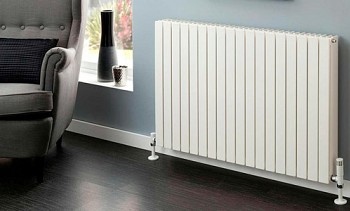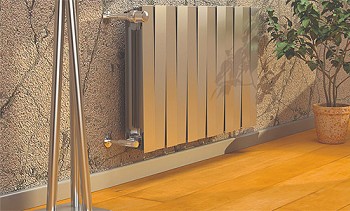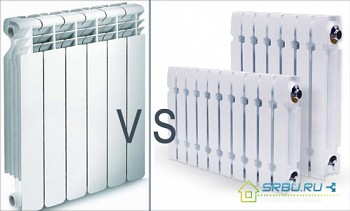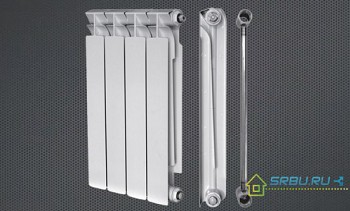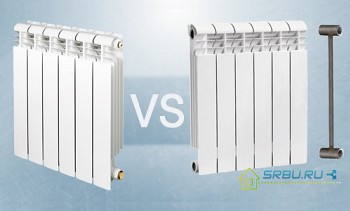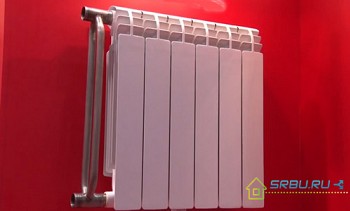Which bimetal heating radiators are better - sectional or monolithic, truly bimetallic or semi-bimetal
Bimetal radiators - are installed without problems, give plenty of heat, and boast a beautiful design. In stores, bimetal heating radiators of various designs and specifications are sold, but we’ll find out which ones are better in this article by analyzing their most important parameters and structural features.
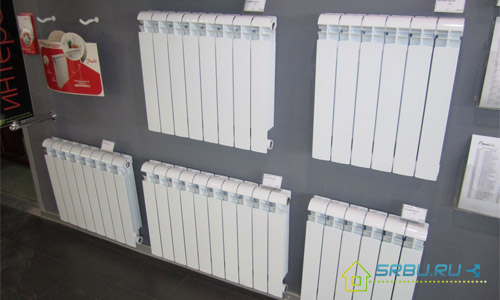
Content:
What is the difference between bimetallic and semi-metallic radiators?
Bimetal
In real bimetal heating devices, only the outer part is made of aluminum. Radiators are manufactured as follows: the pipes of the steel core are welded, and then they are filled with aluminum under pressure. As a result, the coolant is in contact only with steel, without touching aluminum surfaces. This saves the radiator from corrosion and gives it increased strength. Well, the figured body improves the performance of heat transfer.
They also make radiators, the core of which is made not of steel, but of copper. This is a real salvation for those autonomous heating systems where antifreeze is added to the water. After all, such a coolant will quickly destroy steel pipes.
Semi-metal
In a semi-bimetallic radiator, the core consists of two metals. Vertical channels in it are reinforced with steel elements, but horizontal channels are aluminum. Due to the increase in the amount of aluminum in the product, the heat transfer of the radiator increases. However, hot water with a high alkali content (in central heating), in contact with this aluminum, causes corrosion. And one more thing: different thermal expansion of aluminum and steel parts of the core can cause their displacement, leading to the instability of the radiator.
As a rule, bimetallic radiators are installed in apartments with a central heating system. In such systems there are 2 big problems - this is high pressure with periodic surges and low-quality coolant. Both that and another will have rather big negative impact on semi-metal type radiators.
Therefore, since you have decided to install reliable heating devices, it is better to give preference to truly bimetallic radiators. Semimetal models of radiators can be found in companies such as: Sira, Rifar, Gordi. They differ significantly in price from bimetallic, but they are worth it.
Sectional or monolithic bimetal radiators
At first, bimetal products were always assembled from several sections. However, any sectional radiator may suffer from a coolant that damages the joints and reduces the life of the devices. In addition, joints are always a potentially dangerous place, which is more likely to leak due to increased pressure in the system. Therefore, they came up with a new technology by which a solid steel or copper collector is made, and a shirt is made of aluminum over it. Such radiators are called monolithic.
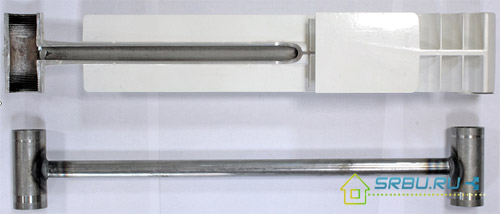
The device section of the bimetallic radiator.
Now let's try to find out which bimetallic radiators are better - sectional or monolithic. In terms of technical characteristics, the advantage of the latter is obvious.
- The term of work is up to 50 years (sectional - up to 20-25 years).
- Working pressure - up to 100 bar (for sectional - up to 20-35 bar).
- Thermal power per section is 100-200 watts (on the same level as sectional models).
But the price of monolithic devices is slightly higher than sectional. The difference can be up to one fifth. And one more nuance: models with a solid core can not be modified by removing the extra or adding additional sections, but at the same time they are available in various sizes both in height and in length. Therefore, it is not difficult to choose a radiator necessary in power.
If the apartment is located in a high-rise building, the height of which exceeds 16 floors, then we can assume that the coolant pressure will be significant, so in this case there is a need to give preference to monolithic models.
Which company is better bimetal radiators
Italy
Let's start with the Italian manufacturers. First of all, this is Sira, whose specialists invented bimetal radiators. You can also mention the Global Style and Radena brands. All these products have a price per section from 700 to 1500 rubles. Elegant and high-quality finish, interesting design, compactness and lightness - these are the radiators from Italy. Modern technologies allow them to work for at least 20 years. Specifications:
- Sectional thermal power - from 120 to 185 watts;
- limit of hot water temperature - 110 degrees;
- working pressure - up to 35 bar.
Russia
Do not forget about domestic manufacturers. One of the most famous is Rifar. This is a company from the Orenburg region that produces thermal appliances with prices ranging from 500 to 900 rubles per section. Specifications:
- Sectional thermal power - from 100 to 200 watts;
- limit of hot water temperature - 135 degrees;
- working pressure - up to 20 bar.
Note the patented radiator RIFAR MONOLIT, which is often called one of the best domestic appliances. It is tested at a pressure of 150 bar. Specifications:
- Sectional thermal power - from 134 to 196 watts;
- limit of hot water temperature - 135 degrees;
- working pressure - up to 100 bar.
Other countries
Here you can note the radiators of the South Korean company MARS. Their core is not steel, but copper. Price - from 400 rubles per section. Declared specifications:
- The limit of hot water temperature is 130 degrees;
- working pressure - up to 20 bar;
- sectional heat transfer - 167 watts.
The Polish company REGULUS-system also produces bimetallic radiators with a copper core. The manufacturer guarantees 25 years of operation. Specifications:
- Working pressure - 15 bar;
- the limit of hot water temperature is 110 degrees.
Well, a few words should be said about the Chinese manufacturers. Their radiators are significantly cheaper than well-known brands, as they do not shine with careful finish and beautiful design. In principle, if you have a very modest budget, you can take the "Chinese", given that he can withstand less pressure.
Table: Comparative characteristics of some manufacturers and models of bimetal radiators
| Brand, country | Model | Distance between axles, mm | Dimensions H / W / D (sections) | Maksim. working pressure, bar. | Thermal Power, W | The volume of water in the section, l | Weight, kg | Max. tamper. heat carrier |
|---|---|---|---|---|---|---|---|---|
Italy |
STYLE 350 STYLE 500 STYLE PLUS 350 STYLE PLUS 500 |
350 500 350 500 |
425/80/80 575/80/80 425/80/95 575/80/95 |
35 | 125 168 140 185 |
0,16 0,2 0,17 0,19 |
1,56 1,97 1,5 1,94 |
110 |
 Italy |
BiLiner Inox 500 BiLiner 500 |
500 | 574/80/87 | 20 | 171 | 0,2 | 2,01 | 90 |
Germany |
TENRAD 350 TENRAD 500 |
350 500 |
400/80/77 550/80/77 |
24 | 120 161 |
0,15 0,22 |
1,22 1,44 |
120 |
Russia |
RIFAR Forza 350 RIFAR Forza 500 RIFAR MONOLIT 350 RIFAR MONOLIT 500 |
350 500 350 500 |
415/90/80 570/100/80 415/100/80 577/100/80 |
20 20 100 100 |
136 202 136 194 |
0,18 0,20 0,18 0,20 |
1,36 1,84 1,5 2,0 |
135 |
China |
Gordi 350 Gordi 500 |
350 500 |
412/80/80 572/80/80 |
30 | 160 181 |
0,21 0,3 |
1,4 1,7 |
110 |
Italy |
Gladiator 200 Gladiator 350 Gladiator 500 |
200 350 500 |
275/80/80 423/80/80 |
30 | 90 140 185 |
0,1 0,13 0,42 |
0,65 0,85 1,6 |
110 |
Roof tile Joker - reviews and opinions on the roofing with this profile
Color in the interior of a children's room: ideas, recommendations and photo examples
How to make concrete, proportions, calculation of the composition of concrete mix
Stretch ceiling in the kitchen - reviews and opinions on the use in this room

